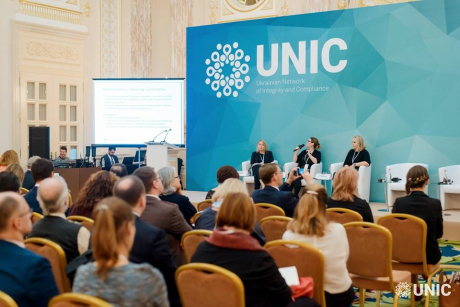Introducing the Ukrainian Network of Integrity and Compliance as a new member of the B20 Collective Action Hub

The Ukrainian Network of Integrity and Compliance (UNIC)
At the launch of the Ukrainian Network of Integrity and Compliance (UNIC) in October 2017, the Business Ombudsman of Ukraine, Algirdas Semeta, said that "corruption remains a serious obstacle to economic growth in Ukraine. Transparency International ranks Ukraine 131st out of 176 in the Corruption Perception Index, which is why this network should help bring together leaders in the business community who understand how important transparency is in doing business and who are prepared to offer a role model to other companies."
UNIC was founded by the Ukrainian Business Ombudsman Council, with the support of the European Bank for Reconstruction and Development (EBRD) and the Organization for Economic Cooperation and Development (OECD) to promote ethical business practices of companies operating in Ukraine. As of today, 50 companies have signed the pledge of integrity, passed the self-declaration of compliance and business integrity, and have started working on enhancing their compliance culture. Leading by example the member companies are sparking a debate on how to do business that extends beyond the membership. Companies that join the Network commit themselves to improving their integrity standards and audit their own levels of compliance on a regular basis monitored by UNIC-recognised certifiers. By instituting a strong compliance culture in the foundation of company’s operations, businesses will be able to counter corruption more effectively, lighten regulatory pressures, and ease access to credit and entries into foreign markets. Business-driven integrity can also be an important driving force to help improve Ukraine’s investment climate overall.
UNIC illustrates the importance of timing and a strong business case for getting a Collective Action off the ground.
The strong business case that underpins the Network played a major role in attracting interest and engagement from the private sector in the lead up to the establishment of the initiative. As Pavlo Verkhniatsky, Managing Partner, COSA, remarks: “The Ukrainian companies are forced to "clean up and keep clean" for the opportunity to borrow or attract investors from abroad. Today lack of so-called compliance risks is one of the most important investment criteria. And this, in fact, covers a wide variety of requirements such as the transparency of the organizational structure, finances and lack of involvement in corrupt practices. Another important factor is the desire of Ukrainian companies to work with their Western counterparts, which in turn means measuring up to their compliance programs. Most US companies and other international companies conduct a due diligence of all their partners in foreign jurisdictions, including Ukraine.”
Mr Verkhniatsky further elaborates on why the business case for an anti-corruption Collective Action in Ukraine is particularly strong at this point in time.
While it is true that there is rising consumer interest in business being conducted ethically, it’s the market conditions and the shortage of domestic financing that is forcing the hands of many companies. The connection of domestic Ukrainian firms with international companies that have compliance deeply embedded in their company’s structure and identity is also having an effect on the business mindset.
Shifting the cost-benefit analysis of Compliance.
The commonly held belief that compliance is too expensive and not financially viable no longer holds true for most companies in Ukraine. Yet Compliance is only slowly being treated as a sound investment and not simply a costly burden.
While it is encouraging to see that Compliance is coming to the forefront of business decisions, it is still a long way to transform this development into a shift in business culture. This is where member companies see the added value of Collective Action, to ensure that the changes go beyond lip-service and a piece of paper in a drawer. Companies need to be supported and held accountable for the commitments they make as a member of the UNIC.
Next steps: Expanding the membership and working towards impacting policy.
A business integrity network cannot be built in one day. As Ivan Sakal, Financial Director, Agrofusion, and the Head of the Executive Board of the UNIC notes “As of now the UNIC covers 50 companies from 46 cities and around 60k employees, the key challenge is expanding the network seeding the business integrity in distant parts of our country. UNIC, in its turn, will support committed businesses to increase transparency, good governance, and healthy competition. Since its formation, UNIC started to work on strengthening the anti-corruption programmes of its member companies by providing systems, tools, policies, and best practices to help them”. Sooner or later, UNIC should impact policy-making and guidelines on integrity and honest and transparent business conduct at the state level, as well as at the level of different organizations sharing the common interest in improving the business climate of the country.”
Although the Network was only launched a couple of months ago, member companies can already share success stories in relation to customers welcoming the initiative and their interest in UNIC. Translating the theory of the business case into business reality is a promising step towards engaging more businesses and expanding the membership base.
Supporting Collective Action Initiatives
The International Centre for Collective Action has been a supporter throughout the conceptualization and establishment of the UNIC and is pleased to continue to support the Initiative in its development as a member of the B20 Collective Action Hub.




